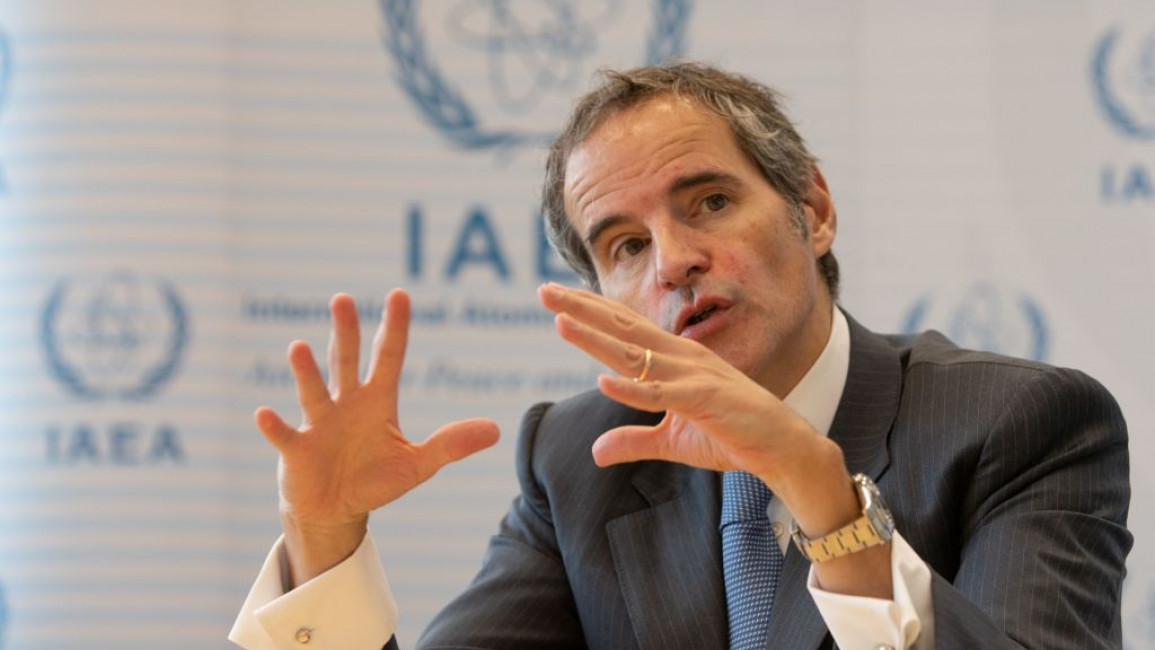UN nuclear watchdog seeks 'common ground' with Iran ahead of talks on reviving nuclear deal
The UN nuclear watchdog said Tuesday it was seeking "common ground" with Iran days after reporting that the Islamic republic had sharply increased its stockpile of highly enriched uranium.
International Atomic Energy Agency chief Rafael Grossi made the remarks following talks with officials in Tehran ahead of negotiations next week aimed at salvaging the 2015 Iran nuclear deal.
His visit comes after the IAEA said Iran had boosted its stockpile of highly enriched uranium to many times in excess of the limit laid down in the landmark accord.
"Our work has been intense since the morning," Grossi said at a joint news conference in Tehran with Mohammad Eslami, the chief of the Atomic Energy Organization of Iran.
"We are continuing at this point the negotiations with a view to find a common ground," he said.
"There are other issues that we are working on and... it is very important to put this into the perspective of the peaceful nuclear programme of Iran.
"We are multiplying our efforts with a view to conclude our exchanges today."
In a brief statement, the Atomic Energy Organization of Iran said "establishing a clear framework for cooperation between the IAEA and the agency is one of the main topics of discussion".
The talks come ahead of the scheduled resumption on Monday of negotiations between Tehran and world powers aimed at saving the 2015 deal that gave Iran sanctions relief in return for curbs on its nuclear programme.
On November 12, Grossi had described as "astonishing" his lack of contact with the new Iranian government of ultraconservative President Ebrahim Raisi.
Days later, Tehran responded by announcing it had invited the watchdog chief to visit.
There was no mention of Grossi's visit in Iran's ultraconservative newspapers on Tuesday.
Iran's foreign ministry spokesman Saeed Khatibzadeh expressed hopes on Monday that his visit would be "constructive".
"We have always advised the IAEA to stay on the path of technical cooperation, and to not let certain countries pursue their political orientations on behalf of the IAEA," he said.
Iran began easing its commitments under the deal in 2019, a year after then president Donald Trump unilaterally withdrew the United States from the accord and began imposing crippling sanctions.
Trump's successor Joe Biden wants to bring Washington back into the agreement, which is known formally as the Joint Comprehensive Plan of Action, or JCPOA.
Tehran is demanding all sanctions imposed or reimposed on it by the US since 2017 be lifted.
The IAEA said last Wednesday in a report seen by AFP that Iran boosted its stockpile of highly enriched uranium to 2,489.7 kilograms.
The total amount now includes 113.8 kg enriched to 20 percent, up from 84.3 kg in September, and 17.7 kg enriched up to 60 percent, up from 10 kg, it said.
The United States warned later that Iran was reaching the point of no return for reviving the nuclear deal.
"The time will come if Iran continues at this pace with the advancements they've made, [it] will make it impossible even if we were going to go back to the JCPOA to recapture the benefits," the US envoy for Iran Robert Malley said on Friday.
The November 29 talks will be held in Vienna, where the IAEA is based.
The remaining parties to the deal - Britain, China, France, Germany and Russia - will join the talks while the United States will participate indirectly.



